
In Chapter 10A, we discussed Terrain, which turned into a self-contained meditation on "the different ways that a game can go". We've determined that the Terrain is formed by the pressures exerted by the players of the game. The rest of the chapter is dedicated to exploring an entirely different set of causes for losing the game. Let's begin:
14. Now an army is exposed to six several calamities, not arising from natural causes, but from faults for which the general is responsible. These are:
Flight; insubordination; collapse; ruin; disorganization; rout.
Flight; insubordination; collapse; ruin; disorganization; rout.
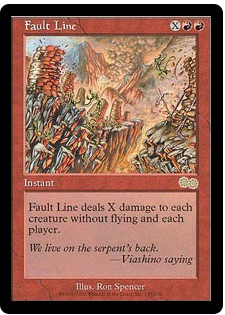
15. Other conditions being equal, if one force is hurled against another ten times its size, the result will be the flight of the former.
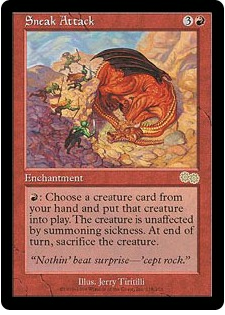
This feels like its a part of the mythical "Good mono-red Commander deck".
The implication of this verse is that it is impossible to be surprised by the fact that the opposing army was ten times your size. It's the kind of thing you have plenty of time to realise, and no chance of excusing later on. Use your combat math and anticipate the likely result of your actions.
16. When the common soldiers are too strong and their officers too weak, the result is insubordination. When the officers are too strong and the common soldiers too weak, the result is collapse.
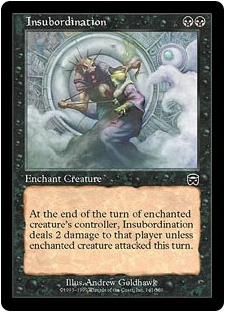
In terms of people, pitch your demands in terms that they can understand and accept. Where possible, I phrase my demands as "Attack someone else instead of me, or I will Beast Within your planeswalker/Phyrexian Arena". It doesn't always work, but it works better than "Attack someone else or I'll destroy everything you ever loved" and its leagues ahead of "Attack someone else or I'll pout coquettishly".
If someone tells me that if I use my only piece of removal on creature X they'll take out the really threatening Y and Z, I consider that to be an amazing deal. It's couched entirely in game terms, it's firm, and it's filled with two people taking part in the joys of mutual benefits! There are still countless variations on how to handle this kind of political situation: I favour coercing other players into spending their removal on pain of losing some of their own permanents. Many players in that position insist that Y and Z were killed regardless of their help. I live in fear of the day that those players use their leverage to force the owner of X to attack a common enemy. More passive players would insist on waiting until X, Y or Z turned on them before revealing their removal, because they believe table talk is for wusses.
17. When the higher officers are angry and insubordinate, and on meeting the enemy give battle on their own account from a feeling of resentment, before the commander-in-chief can tell whether or not he is in a position to fight, the result is ruin.
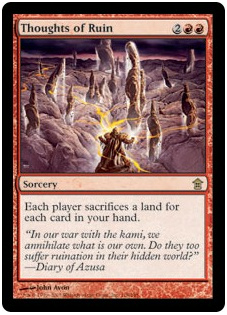
It works well with Kaalia. It felt dirty, but awesome.
If you see a rival of yours doing a 'thing', and you decide to attack because hey, they're your rival and you stopped them from doing that thing, zoom out and look at a bigger picture. Your rival is your rival because they beat you more often than you would like. If you want to get revenge on a rival, you don't do it through dealing petty damage that stunts your own development. Instead, you focus on turning your rival into just one more person that gets beaten in the natural course of you winning, and you do it by only hitting them when it really hurts them and doesn't hurt you back.
18. When the general is weak and without authority; when his orders are not clear and distinct; when there are no fixed duties assigned to officers and men, and the ranks are formed in a slovenly haphazard manner, the result is utter disorganization.
“Be polite, be professional, but have a plan to kill everybody you meet.”
- James Mattis. If you have a few minutes to trawl through an archive of cartoonishly badass quotes, click that link.
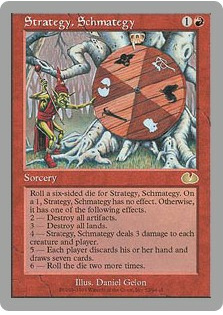
If you have a theme, but add in a few non-synergistic generically good cards just 'because', you are disorganised.
If you have sharp technical play but make completely random decisions about who to attack once or twice a game, you are disorganised.
If you know your friends and the decks they play and you think about who to prioritise in each game, but you backstab people because they tapped out... You. Are. Disorganised.
Organisation is a huge topic worthy of its own article series. Here are some search terms to help you start writing it: Merlin Mann, lifehacker, 43folders, organisation, Ann LaMott, Bird by Bird, Flow. I will probably start writing more on that subject at the conclusion of this series. If you beat me to it, I might be able to offer editing services.
19. When a general, unable to estimate the enemy's strength, allows an inferior force to engage a larger one, or hurls a weak detachment against a powerful one, and neglects to place picked soldiers in the front rank, the result must be rout.
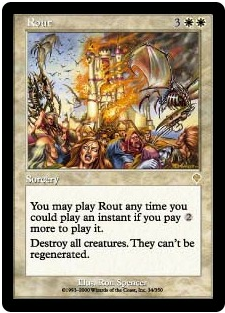
If they have a morph, it is the worst possible morph for you in that situation.
If they have an untapped blocker, even an untapped 6/1 that they'd prefer to keep around to finish off a player on single-digit life, don't attack.
You need information before you can decide whether or not its safe to attack.
20. These are six ways of courting defeat, which must be carefully noted by the general who has attained a responsible post.
This concludes the list of six calamities. The real-life observations arising from our academic source are applicable to our studies, so read them. They emphasise the importance of clearly communicating your intentions to your audience, never hesitating and never second-guessing. It's good advice! Follow it.
21. The natural formation of the country is the soldier's best ally; but a power of estimating the adversary, of controlling the forces of victory, and of shrewdly calculating difficulties, dangers and distances, constitutes the test of a great general.
By using the concept of terrain in the way we laid out in Ch 10(A) as a foundation, we can say that we understand the different ways a game might go. In this chapter, the focus has emerged into learning to recognise how the game will go in the next turn, based on your own ability to bruce yourself into calamities and the effect that other player's desires will have on the game.
There's something about the phrase 'controlling the forces of victory' that sticks out to me. It's reminds me of one of John F. Rizzo's classic pieces. Remember, understanding the forces at work in a multiplayer game is not the same as actually controlling the forces that go into a multiplayer game.
22. He who knows these things, and in fighting puts his knowledge into practice, will win his battles. He who knows them not, nor practices them, will surely be defeated.
An anecdote: I played piano for years, but I was never a fan of practicing. As a result, my ability to play plateaued and then atrophied. When I first started playing, I was told that a pianist is supposed to curve their hands as though they were clasping a stress ball. I insisted on just holding my fingers out straight and slamming them into the keys – there were only one or two notes to hit, it didn't sound all that different, what was the point? You're also supposed to start on your second or third finger for long runs, pass your thumb under your hand, then pass your thumb under your fourth finger so that you never 'run out' of fingers. Because I hated not being instantly awesome at piano, I would practice doing anything except proper technique, confident that my natural abilities would help me find a far superior way of doing the long runs of notes. In any case, when I found myself actually able to hear and analyse the note I was playing, I discovered that I really needed some way to moderate the volume and the emotion behind each note and the best way to do that was to curve my hands, as though I was clasping a stress ball. Similarly, when the time came to play really complicated pieces with long runs of chromatic scales, my fingers were all jittery and useless.
Conclusion: If you care about what you're doing, find someone who knows more than you do and learn the proper technique from them. If you can find proper technique, practise it properly. Practising the wrong technique, or just lapsing into it on occasion affects your ability to perform at a better level. When I started, I didn't know. When I did know, I didn't do. Now I'm bad at piano.
23. If fighting is sure to result in victory, then you must fight, even though the ruler forbid it; if fighting will not result in victory, then you must not fight even at the ruler's bidding.
There are a few problems with the presentation of this passage: for example, America has a huge army, but New Zealand has no army. If America is sure to win a fight with New Zealand, this passage would, on the surface, suggest that America should invade New Zealand, even if there's no good reason to do so and the UN forbade it. Conversely, if hostile aliens dropped out of hyperspace tomorrow and began subjugating earthlings, most people would put up a resistance. It can be concluded that this is not a good guide to real life in the modern era. (That didn't stop the Gruen Transfer from commissioning ads to publicise the idea)
In the context that Sun Tzu is discussing, we must conclude that he's talking more about a single battle rather than an entire war. A continuing theme for Sun Tzu is a desire not to spend more time bogged down in fighting than absolutely necessary: attacks are made cleanly with an emphasis on killing all of their dudes, none of yours, and being home before winter. Similarly, if you can attack and kill your enemy, you need a really good reason not to do that.
24. The general who advances without coveting fame and retreats without fearing disgrace, whose only thought is to protect his country and do good service for his sovereign, is the jewel of the kingdom.

25. Regard your soldiers as your children, and they will follow you into the deepest valleys; look upon them as your own beloved sons, and they will stand by you even unto death.
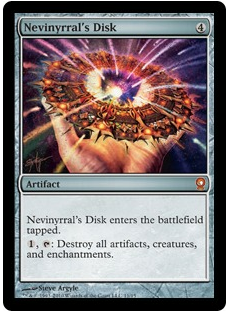
Where were youuuuu?
Also, if you have more than one deck, do what you can to keep organised.
I was playing with one of my weaker decks last week - I hadn't played in a while and was itching to play with something a little bit goofier. The deck itself was a mix of the two artifact decks from Planechase I and Archenemy and cool artifacts from my extensive junk rare collection. It won by dropping Darksteel Forge and Nevinyrral's Disk and then taking its own sweet time to grind out life points. The crucial moment came and passed as Kuldotha Forgemaster prepared to spew my key pieces on to the field. I was missing the Disk. All of a sudden, I remembered that I'd needed one to improve some other Commander deck. I couldn't find any other useful cards inside that pile, so I dropped something unimpressive to the field and started counting my cards. I wasn't just short a disk. Oh no. I was short ten other cards. I have noooo excuse for that. You can learn something from this that you're not gonna hear that from the mouths of Pro Tour winners dishing out tournament based strategy to the masses, which is what makes this series unique.
If you've got ten Commander decks, keep an eye on your least favourite.
26. If, however, you are indulgent, but unable to make your authority felt; kind-hearted, but unable to enforce your commands; and incapable, moreover, of quelling disorder: then your soldiers must be likened to spoilt children; they are useless for any practical purpose.
Do not practice appeasement. If people are being jerks, hit them back at the second opportunity (Good game theory requires you to forgive in the first instance). Don't bide your time. Players are like recalcitrant puppies – if they poop on your kitchen table, you should rub their nose in it before they forget. Otherwise they'll forget what they did to you and someone will break out the 'passive-aggressive' label. Don't over-commit to vengeance, either. Walk a perfect tightrope, never ever stray from my vague guidelines and broad strategic points and try not to stress to not about whether or not I'll judge you if you fail. (I will.)
27. If we know that our own men are in a condition to attack, but are unaware that the enemy is not open to attack, we have gone only halfway towards victory.
Find some way to see your opponent's hands. There are cards that actually have that effect, there's also attacking or just waiting until they make an expansive gesture. You can watch how they respond to another player's threats. You can make probes about a team-up with them to learn what they can offer you and what they'd be willing to expend on another player. If you start following this line of thought, always finish your negotiations concretely and don't develop a reputation as 'that guy who only talks to people to line up backstabs'. You should also, like, end up in mutually beneficial team-ups every so often.
28. If we know that the enemy is open to attack, but are unaware that our own men are not in a condition to attack, we have gone only halfway towards victory.
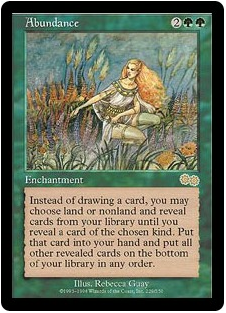
In addition, if you're aware that your fighting men are not in a position to attack, and you're trying to find a way to keep a steady stream of business cards into your hand, consider: Armistice, Oblation, Treasure Trove, Explosive Revelation, Abundance. If you're playing Black, you're playing Phyrexian Arena and Necropotence. If you're not, Hello! Welcome to Magic. It's great, you'll love it.
29. If we know that the enemy is open to attack, and also know that our men are in a condition to attack, but are unaware that the nature of the ground makes fighting impracticable, we have still gone only halfway towards victory.
During your not-turn, make a habit of guessing what your opponents will do and what they won't do. Ask yourself what cards you would want if you were them. Work out what kind of cards they may have.
When you're trying to think about the 'terrain' of the game, you should be thinking about the contents of Chapter 10A. What cards are in play and how do they entangle or temporise the ground? Is someone able to make a clear rush towards victory?
30. Hence the experienced soldier, once in motion, is never bewildered; once he has broken camp, he is never at a loss.
As soon as Phase 2 breaks out, you need to spend less time thinking about your own turn and more time evaluating everyone else's board.
31. Hence the saying: If you *know* the enemy and *know* yourself, your victory will not stand in doubt; if you know Heaven and know Earth, you may make your victory complete.
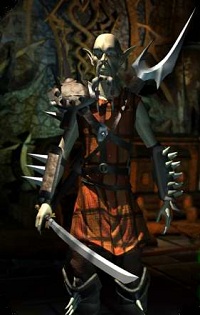
"Strength lies in knowing oneself. I learned
that once someone does not *know*
themselves, they are lost.
They become a tool for others."
- 1st Circle of Zerthimmon
I had initially thought of these as being a gradient that you progressed along: you know a little about your enemy (their choice of general, the normal strengths and weaknesses of those colors), you know a little more about your enemy (how their general shapes the deck and the special tricks they use to get the most out of that general), to having almost-perfect knowledge of their deck (you have their decklist and you know what cards rotate in and out of the deck to the point where you can subconsciously card-count how much removal they have left). Maybe there is some use in this 'next-level' thinking, but given the number of people you're playing against and the rotation of new cards and new generals into the format with each new set, you should ideally never reach a perfect understanding of your opponent.
Instead of the slippery uphill slope of knowledge, I offer a much more mechanical model. There are four binary values -
Do you *know* what you are a capable of? (YES/NO)
Do you *know* what your opponents are capable of? (YES/NO)
Do you *know* what can happen during a game? (YES/NO)
Do you *know* how the groupthink feels about the game? (YES/NO)
If you answered "Yes" to the first two questions, your victory is certain. If you answered "Yes" to the second two questions, your victory is most certain. These differing levels of understanding make the difference between victory and defeat when you venture out to play games against skilful opponents.
It's worth noting that Sun Tzu claims that if you know the answers to the first two questions, your chance of victory is 100%, and knowing the second brings you all the way up to... 100%. From a theoretical standpoint, you would assume that this is nonsensical. In practise, it's absolute truth. In my experience with game design, you quickly reach a point where 90% of the content has been generated. At this point, crunch time begins - you go through that 90% looking for bugs and things to polish, and that takes up the other 90% of your effort and sanity. So the difference between making your victory certain and making your victory complete is that "last ninety percent".
That's all, folks! Chapter Eleven will be along just as soon as I can write it.
Comments